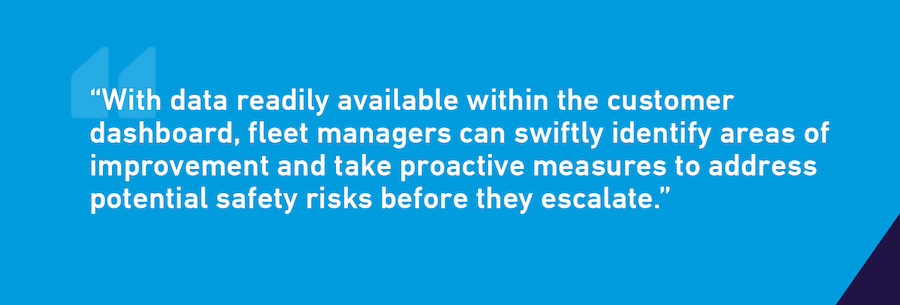Unlocking Insights: Data That Helps You Level Up Your Safety Game

When it comes to an organization’s safety measures, proactive efforts are the gold standard. Prioritizing proactive over reactive strategies helps cultivate a culture of prevention, fostering resilience and minimizing the likelihood of catastrophic events happening in the first place.
A rigorous menu of reporting options helps fleet managers gain comprehensive, in-depth knowledge about risk, and provides the data to help advance fleet safety from a reactive to a proactive stance.
Within Lytx®, different reports help assess a fleet’s safety risk by revealing trends, nuanced details, and big-picture context. Lytx customers can access valuable data in ways that enable agile decision-making and efficient integration of safety measures across the organization.
Instant insights from the customer dashboard
.jpg)
Corral the data that can help address specific concerns, inform processes and policies, and make real, measurable improvements in fleets. Reports available through the customer dashboard provide account data to help get a quick read on where to focus efforts and drive actions—data invaluable to coaches and managers.
For example:
- Driver Report: Offering invaluable insights into driver performance. Identify the top performers for recognition or their ideas on better ways to operate. Determine which drivers need further coaching, and which behaviors to address.
- Event Data Extract: Providing detailed information and empowering managers to analyze data according to their specific needs. Export, filter, and sort the data for coaching status, behaviors, and more. This self-service data extract enables on-demand insights and custom analyses.
With this data readily available within the customer dashboard, fleet managers can swiftly identify areas of improvement and take proactive measures to address potential safety risks before they escalate.

Management-level reports for strategic oversight
While frontline coaches may delve into the nitty-gritty of driver and technician performance, upper management requires a broader view of program trends and fleet health. Subscription-based, management-level reports cater to this need, offering executives, safety managers, and directors valuable data and accountability tools.
Examples include:
- Executive Reports: Offering a comprehensive overview of program performance and trends. Lytx customers can advance their monthly or quarterly reviews with data from Executive Reports, such as a Driver Report focusing on a set of specific behaviors, or a Group Report showing coaching effectiveness metrics over time. Other reports can be customized to prove return on investment, provide quarterly or annual results, and justify the need for upgrades and expansions.
- KPI Report: Highlighting key performance indicators critical for strategic decision-making. Find out what is going right and identify opportunities for improvement toward division goals. Drive accountability and compare performance among groups.
These reports enable leadership to track progress, identify emerging patterns, and effectively align safety efforts with organizational objectives. Customer service managers can create a reporting structure that keeps leadership informed and ready to act.
Integration options for enhanced control
For fleets seeking greater control over their data and the ability to seamlessly integrate safety metrics with their own internal operating systems, integration options and application program interfaces (APIs) offer a compelling solution. Integrations allow safety data to be pulled into an organization’s more holistic internal dashboard and customized for internal reporting. If there is a need to integrate safety data with, for example, a company’s human capital department data or equipment cost data, integration options meet that need. Data can also be integrated with other systems a company might be using, such as cloud-based fleet management software.
Examples include:
- Event Data API: Enabling the integration of safety-related event data with internal systems, facilitating deeper analysis and correlation with other operational metrics.
- Unified Distance API: Providing mileage data essential for fleet management and operational planning.
By leveraging these integration options, fleets can harness the full potential of their data ecosystem, gaining deeper insights and driving more informed decision-making processes.
Robust and varied data-access options empower fleets to not only react to safety incidents, but to anticipate and prevent them altogether. Knowledge is power, and in an industry where safety is non-negotiable, getting the right data at the right time is invaluable.
